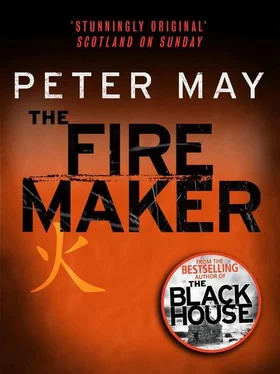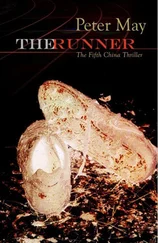Long queues snaked back across marble tiles from a row of hatches that ran the length of the back wall. Destinations were marked above each window in Chinese characters, and Margaret wondered how the casual foreign traveller would know which one to go to. A woman’s strangely disconnected nasal voice droned monotonously over the Tannoy, announcing departures and arrivals. Li joined the back of one of the queues and stood tapping his foot impatiently.
‘Where is your uncle going?’ she asked, more for something to say than out of any real interest.
‘Sichuan,’ he said distractedly.
‘That’s where your family comes from, isn’t it?’
‘He’s going to see my father in Wanxian, and then on to Zigong to talk to my sister.’
There was something in the stress he put on the word ‘talk’ that aroused her curiosity. ‘Is there a problem?’
‘She is pregnant.’
‘That’s a problem?’
‘You ask too many questions.’
‘I’m a nosy bitch.’ She waited.
He sighed. ‘She already has a child.’ He took in Margaret’s frown of puzzlement. ‘You have never heard of China’s One-child Policy?’
‘Ah.’ Understanding dawned. Of course she had heard. And she had always wondered how it was possible to enforce such a policy. ‘What can they do to you if you do have a second child?’
‘When you get married,’ he said, ‘you are asked to make a public commitment to having only one child. You sign what they call a “letter of determination”. In return you receive financial and other privileges — priority in education and medicine for your child, an increase in income, better housing. There is also strong pressure to be sterilised. But if you then go on to have more than one child, you will lose all your benefits, maybe even your house.’ He shook his head slowly, clearly concerned. ‘And during the second pregnancy there will be other pressures, psychological, sometimes physical, to have an abortion. The consequences can be terrible, either way.’
Margaret tried to imagine the US government trying to tell Americans how many children they could have. She couldn’t. But at the same time she knew what unchecked population growth would do to a country that already comprised a quarter of the world’s population. Starvation, economic ruin. It was a dreadful dichotomy. ‘Is she going to have the baby?’ He nodded. ‘But did she and her husband sign this “letter of declaration”?’
‘Yes.’
‘Then why is she so determined to have another child?’
‘Because their first child was a girl.’
Margaret pulled a face. ‘So? What’s wrong with girls? Some would say they’re a lot better than boys.’ She grinned. ‘And, in my humble opinion, there’d be a lot of merit in that view.’
‘Not in China.’
And she saw that he was serious. ‘You’re kidding. Why not?’
‘Oh, it’s not easy to explain,’ he said, waving an arm in a gesture of futility. ‘It has to do with Confucianism, and the ancient Chinese belief in ancestor worship. But perhaps more than all of that, there is one very practical reason. Traditionally, when a son marries he brings his new wife to live with his parents, and as the parents grow aged the younger couple look after them. If all you have is a daughter, she will go to live with her husband’s parents, and there will be no one to look after you in your old age.’
‘But if everyone only has one child, and every child is a son, there won’t be any women to bear the next generation of children.’
He shrugged. ‘I can only tell you how it is. The orphanages are full of baby girls who were abandoned on doorsteps.’
‘So your uncle is going to talk her out of having the baby?’
‘I don’t know what my uncle is going to say to her. I’m not sure he knows himself. But whatever he says, she will listen, in the way that she will listen to no one else.’ He stretched up to look down the length of the queue. It didn’t appear to have moved at all. ‘This is no damned good,’ he said, and pulled out his Public Security ID wallet from a back pocket and pushed his way up to the head of the queue.
Margaret watched from a distance as several people at the head of the queue began to remonstrate with him. She smiled as he turned and with a few sharp words and a flash of his ID silenced their complaints. And some were more equal than others , she thought wryly.
He hurried back across the concourse with the ticket and she followed him outside into the crowded square. ‘I’m sorry, I’m going to have to take the ticket to my uncle first,’ he said, glancing up at the nearer clock tower. ‘His train is in just over three hours.’
‘How long will he be away?’
‘Oh, he’ll be back tomorrow night.’
‘Short conversation.’
Li shrugged. ‘He’ll say what he has to say then go. At the end of the day it is her decision.’
They climbed into the Jeep. ‘What do you think she should do?’ She watched him closely, interested in his reply.
‘I think she should not have got pregnant,’ he said.
‘That’s not what I asked.’
He looked at her very seriously. ‘It is not my problem. I have enough of my own.’ And she realised that a veil was being drawn over a part of him he did not want revealed.
As he shifted into first gear and started to pull away, he had to brake sharply as a woman in her thirties wheeled a pram across their intended path. It was a strange, crude, wooden pram, with two tiny seats facing each other across a small, square table. Home-made, Margaret might have thought, except that she had seen others just like it in the street. But there was only one seat occupied. The other, empty one was a potent symbol of frustrated Chinese parenthood. Li didn’t seem to see it as he waited for the mother to pass, glaring at them as she did. Then he slipped back into gear and squeezed the Jeep into the main stream of traffic heading west on Beijingzhanxi Street.
Songbirds in bamboo cages hung among the pines, competing with wailing renditions of songs from the Beijing Opera. Their voices raised in Eastern discord, a group of a dozen old men, accompanied by the plucks and whines of age-old Chinese instruments, sang behind trembling wisteria in the pergola where yesterday Li had seen a drunken youth sucking alcohol from a plastic bottle. The same white-coated barber was clip-clipping among the trees, tufts of black hair tumbling to the sun-baked dusty earth. Bicycles leaned against tree trunks, their owners gathered around games of cards or chess. Somewhere in the distance, from the park itself, came the sound of a disco beat, insistent and incongruous.
Li and Margaret walked through the dappled early evening sunlight. Li said, ‘In the park there is a lake, Jade Lake, officially designated for swimming. In the winter it freezes over and it is used by skaters. But they cut a hole in the ice at one side for bathers to dip themselves in the freezing water. My uncle does this every morning.’
Margaret shivered at the thought. Li put a hand on her arm to stop her. She glanced at him, then followed his eyes to where an old man with dark, curling hair stood in the shade, legs apart, slowly arcing a sword above his head, before bringing it down in a long slow sweep through 180 degrees to point at the earth. In perfect slow motion, he swivelled on the ball of one foot, folding one leg high to his chest, and turned to swing the sword up and across his body, then out to his right, stamping his raised foot down with a thud, the sword now pointed directly at Li and Margaret. The old man glared at them with fiercely burning eyes and then broke into a broad grin. ‘Li Yan,’ he said. ‘Have you got my ticket?’
Li took the ticket from his pocket and held it out as he approached him. ‘It leaves at eight.’
Читать дальше












